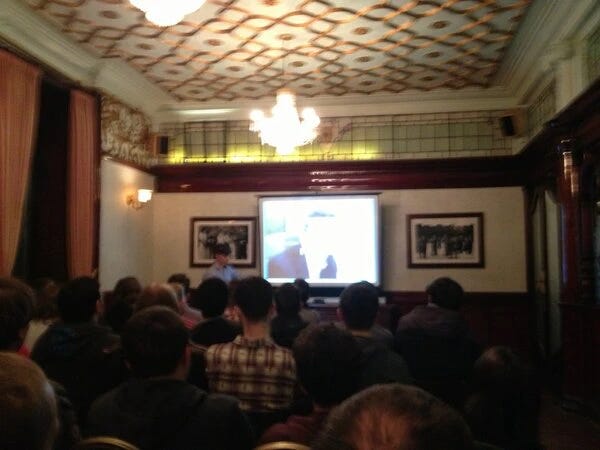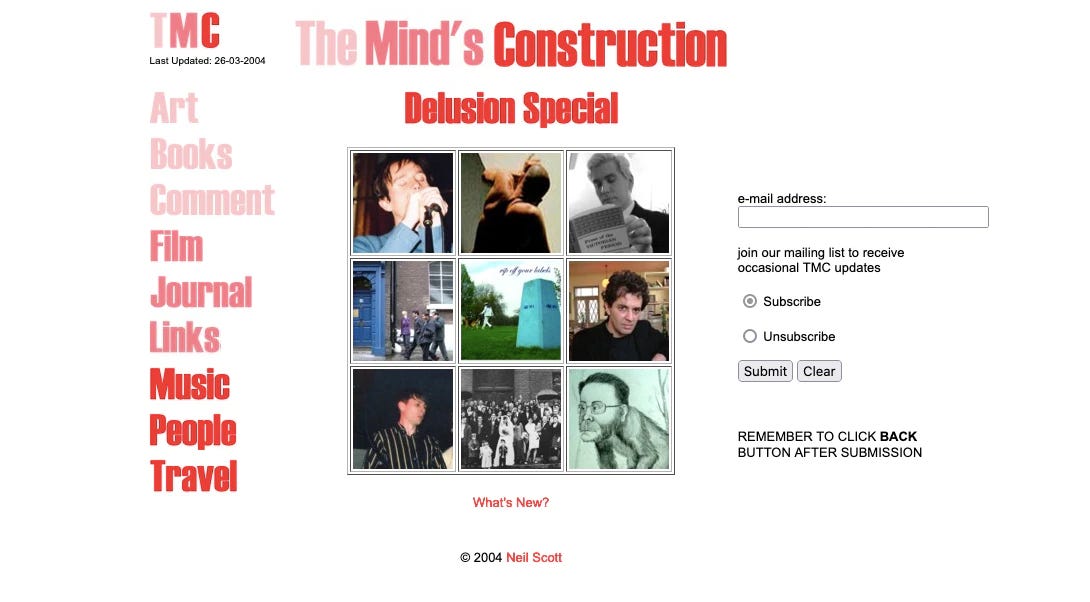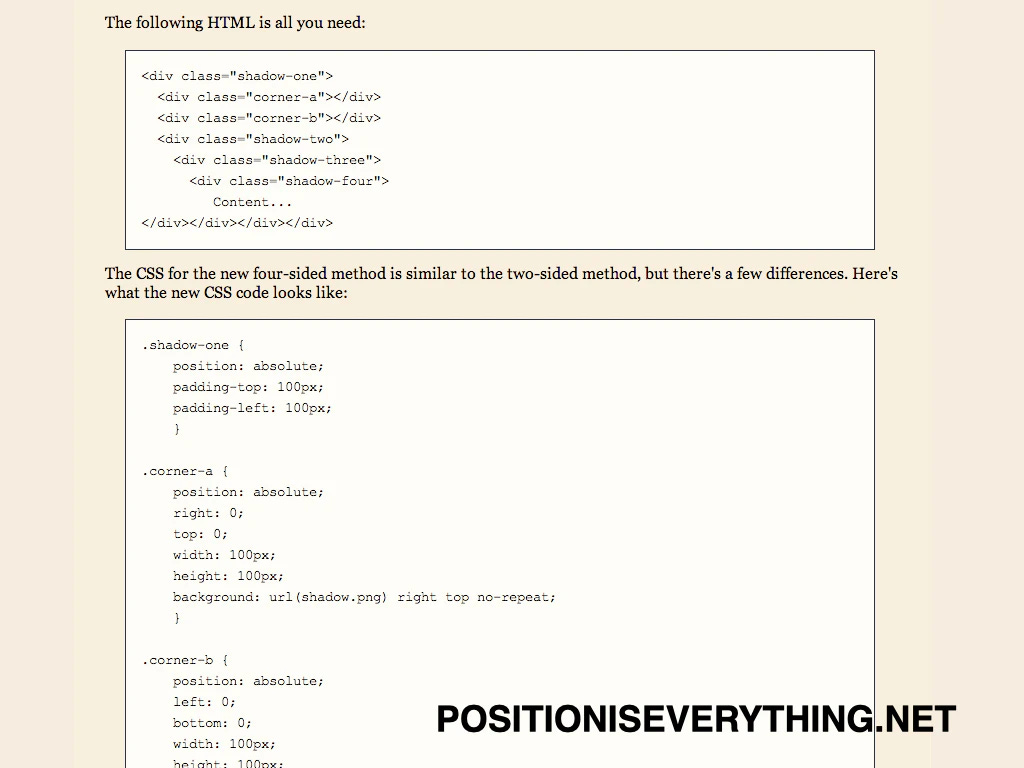One of the things I had wanted to do with this newsletter was to tidy up and publish some talks I’ve given in the past. This one was delivered at Refresh Glasgow on 20 February 2013 and is about what it means to do good, ethical, purposeful work.1 I’ve made a few edits for readability, but this is basically what I said nine years ago.2 After such a long gap, I can’t help but cringe at parts of it, but possibly it has some historic value.
Web design is a young industry and most web designers never studied the subject at university. How could they? It didn't exist as an option and, even if it did, what they taught you would be irrelevant by the time you graduated.
I didn't study Web Design, I studied Film & Literature and then Intellectual History. Alas, there weren't many vacancies for intellectual historians so, after leaving university, I spent eight months working in a supermarket and another two years in a library.
During this time I discovered Geocities, an early web publishing tool. I was amazed that I could publish whatever I wanted without answering to anyone and so learned enough HTML to start my own cultural webzine, The Mind's Construction. Here it is in 2004, at a time when it was starting to help me get into gigs for free.
At one of these gigs, I got talking to a man called John Moore, who used to be in the Jesus and Mary Chain and Black Box Recorder. He offered me the princely sum of £150 to build him a website to promote his solo album. My eyes lit up at the thought of being paid to do something that I enjoyed … maybe, I thought, I could become a professional web designer.
In 2004, the web design world was obsessed with technical challenges like how to do things like getting floats working in IE5 or how to create tabs in navigation that looked and acted like tabs in folders. It is one of the ironies of the Flat Design era3 that it comes at a time when we can use CSS3 to create drop shadows with 1 line of CSS. Compare that to the code soup of 2004:
As the web matures, we're moving away from functional questions and starting to ask deeper questions like: why are we doing what we're doing? And, how we can make the web a more meaningful place?
Motivation
Why do we do what we do? The reasons can be divided into extrinsic and intrinsic motivations.
For extrinsic motivations, we have:
Genetics
Our basic needs and abilities, our animal selves, the lizard brain etc.Parents
Instruction helps shape our moral reflexes with Pavlovian conditioning: smacking us if we're naughty, rewarding us if we're good, and filling us with expectations of what life will be like.Laws and Rules
We try to avoid getting into trouble. On the web, accessibility laws helped ensure that all big companies got on board, despite many not thinking it is in their interest.Money
We do things for money because it gives us freedom and the ability to buy other people's time and skills.Social Acceptance
Human beings thrive in social situations and become depressed when they are isolated and, unsurprisingly, they constantly do things for social acceptance. As teenagers, we do stupid things like smoking cigarettes and wearing weird clothes. As adults, we do more subtly stipid things for social acceptance, such as working in dull dispiriting jobs to buy cars.
Examples of intrinsic motivations include:
Craftsmanship
The pleasure of doing something well.
Curiosity
Experimenting with different ideas and seeing what happens.Meaning
Creating things that are personally significant.
In Drive, Daniel Pink shows that people who only have extrinsic motivations tend to take shortcuts, producing sub-standard work with less enjoyment. This is why people who turn their hobby into a job often find it stops being rewarding.
Worse still, extrinsic motivations are what people regret when they’re dying. In 2013, Bronnie Ware, an Australian geriatric nurse, published a book on the regrets of the dying. These included:
I wish that I had let myself be happier
I wish I had stayed in touch with my friends
I wish I'd had the courage to express my feelings
I wish I didn't work so hard.
But the number one was to have had "the courage to live a life true to myself, not the life others expected of me." That is, the dying people realised they had lived a lie according to social expectations.
According to Pink, intrinsic motivation comes from three things:
autonomy: the sense that you have control over your work;
mastery: the ability to get better at what you're doing; and,
purpose: work that you find meaningful.
How to draw the line
Here are some suggestions to help draw an ethical line and make your work more intrinsically rewarding:
Reduce financial dependence
Money is only important to the extent that you can stop thinking about it. If you don't have financial flexibility it is difficult to sack clients, leave jobs or not compromise your ethics. Time is the truly finite resource. The less money you spend on unnecessary things, the less time you’ll have to spend working on things you don’t like.
Listen to your gut
AKA your conscience, your instincts, your intuition, and your sense of integrity. You can tell your integrity is in question when you feel that bite of conscience, forcing you to decide whether to stop what you're doing or carry on despite the pain.
If you do things that align with your values then your integrity increases. If you go against your values your integrity is diminished. Some peoples instincts are so numbed by doing things they disagree with that their integrity dies entirely leaving them in a perpetual state of bad faith. I don't know how these people live. How can they make any decisions? How can they know what is right or wrong, good or bad, if they have blurred the line so often?
Be decisive
The etymological root of the word 'decision' comes from the Latin for 'cutting off' and, indeed, to make a decision is to cut off possibilities. We have to do this because life is short and will dissipate to nothing unless you focus your time and energy. Identify what is important and clear away all that is unnecessary or distracting.
Learn how to say no
Saying no is really difficult. No one likes no. Everyone likes yes. No is such a drag. We seek approval from people and say yes to things even when we know that saying yes is going to cause more problems in the long run.
As Tim Cook says:
We believe in saying no to thousands of projects so that we can really focus on the few that are truly important and meaningful to us.
Stop caring about what people think
The older I get, the more I realise that no one really cares how anyone lives. You can do whatever you want, dress however you want, and 99.9% of people will respect that decision and move on.
Maybe social media with its likes and retweets is encouraging us to play to the audience. Is it even possible to have a coherent sense of self when you are constantly being assailed by feedback? You can't control other people's reactions, so lose your ego and do what you think is right.
Be an expert
Web design is a service industry. This means that we deal with people who don't necessarily know what we do. For the creative, confidence is often the difference between being treated like a cleaner or a doctor. People (usually) employ a cleaner because they can't be bothered to clean their house themselves. People employ a doctor because they are a professional with the expertise they lack. Being an expert gives you the confidence to stand up to people and not let their rank deflect you from the truth.
Avoid Bozos
I was struck by this passage in Walter Isaacson's biography of Steve Jobs:
"[Jobs saw] the world in binary terms. A person was either a hero or a bozo, a product was either amazing or shit. His goal was to be vigilant against 'the bozo explosion' that leads to a company being larded with second-rate talent."
Most of us put up with bozos, but Jobs would fire them. He didn't do this just because he was mean, but rather because he knew that bozos ruin everything by clouding decision-making and causing long-term problems.
Bozos are the ones who are cynical and complain about everything, they incurious about new developments, engage in bikeshedding, and are incapable of saying no to the non-essential.
Your portfolio
Web designers are only as good as the work they’ve done. Your portfolio is the story of your encounters with clients over the years. If you draw an ethical line, the choices you make are much easier: you know exactly what you need to do and can hear the bark of your conscience in the distance long before it bites you.
I read a story recently that said every hour you spend sitting takes 22 minutes off your life. If we are going to spend most of our lives sitting, staring at screens, we might as well do something good while we're there.

The subject of ethics must have been in the air as, around the same time, Cole Peters reissued First Things First, a manifesto committing people to avoid unethical practices, Neil McGuire and Keith Dodds curated an exhibition of political graphic design at The Lighthouse, and David Coyle became semi-retired from graphic design in disgust at its stupidity.
There is audio of the talk recorded by Robbie Manson on his phone. Curiously, Robbie went to work for Facebook/Meta and is now in the department focused on Integrity.
Flat design was the hot new thing in 2013 and meant that people stopped using skeuomorphic elements like shadows and tabs.





Another inspiring and thought provoking article. Reminds me that I must start cutting out a few displacement activities!